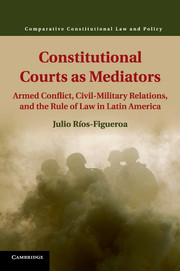 Constitutional Courts as Mediators
Constitutional Courts as Mediators Book contents
- Frontmatter
- Dedication
- Contents
- List of Figures
- List of Tables
- Acknowledgments
- 1 Constitutional Courts and the Armed Forces
- 2 A Theory of Constitutional Courts as Mediators
- 3 Constitutional Jurisprudence on Military Autonomy in Colombia, 1958–2013
- 4 Constitutional Jurisprudence on Military Autonomy in Peru, 1979–2013
- 5 Constitutional Jurisprudence on Military Autonomy in Mexico, 1917–2013
- 6 Judicial Regulation of the Use of Force in Colombia, Peru, and Mexico
- 7 Constitutional Courts as Mediators beyond Latin America
- 8 Constitutional Courts and Democratic Confl ict Solving
- References
- Index
4 - Constitutional Jurisprudence on Military Autonomy in Peru, 1979–2013
Published online by Cambridge University Press: 05 May 2016
- Frontmatter
- Dedication
- Contents
- List of Figures
- List of Tables
- Acknowledgments
- 1 Constitutional Courts and the Armed Forces
- 2 A Theory of Constitutional Courts as Mediators
- 3 Constitutional Jurisprudence on Military Autonomy in Colombia, 1958–2013
- 4 Constitutional Jurisprudence on Military Autonomy in Peru, 1979–2013
- 5 Constitutional Jurisprudence on Military Autonomy in Mexico, 1917–2013
- 6 Judicial Regulation of the Use of Force in Colombia, Peru, and Mexico
- 7 Constitutional Courts as Mediators beyond Latin America
- 8 Constitutional Courts and Democratic Confl ict Solving
- References
- Index
Summary
Nueve sentencias del tribunal constitucional interpuestas por 64 ONGs casi desaparecen la justicia militar…. Pero con una sola sentencia logramos revertir las nueve en contra y hasta nos devolvieron facultades.
(Nine decisions by the constitutional tribunal filed by 64 NGOs almost destroyed military justice…. But with one decision we managed to revert those previous nine decisions and to even get back some prerogatives.)
Contra Admiral CJ (R) Carlos Mesa Angosto, former president of the Superior Military Tribunal (El Correo, December 25, 2012)This chapter analyzes constitutional jurisprudence on military autonomy in two recent periods of Peruvian history: the first starting in 1979, the year when the constitution was enacted following ten years of military rule, until 1992; and the second from 1993, the year when the current constitution was enacted, until 2013. Specifically, I quantitatively and qualitatively analyze the decisions made by the tribunal of constitutional guarantees during the first period, and in the second those made by the constitutional tribunal in cases that challenge a previous decision made by a military authority (e.g., a military court, prosecutor, officer, or military administrative agency), and in cases that reach the constitutional organ on the scope of the military jurisdiction.
Taking advantage of the fact that the constitutional tribunal enjoys lower levels of independence, but higher levels of access, and powers of judicial review than the tribunal of constitutional guarantees, I explore whether the constitutional tribunal's behavior is closer to the ideal of third-party mediator in conflict resolution than the behavior of the tribunal of constitutional guarantees. To quickly preview the conclusion of the chapter: the answer is that the jurisprudence of the two courts is clearly different, but not to the extent that the constitutional tribunal can be considered an actual mediator. The main reason is that the constitutional tribunal lacks independence, which is a necessary condition for producing mediator-like jurisprudence. In the chapter, this lack of independence is nicely reflected in inconsistent jurisprudence produced by the constitutional tribunal and summarized by Contra Admiral Mesa Angosto in the epigraph.
- Type
- Chapter
- Information
- Constitutional Courts as MediatorsArmed Conflict, Civil-Military Relations, and the Rule of Law in Latin America, pp. 82 - 118Publisher: Cambridge University PressPrint publication year: 2016


